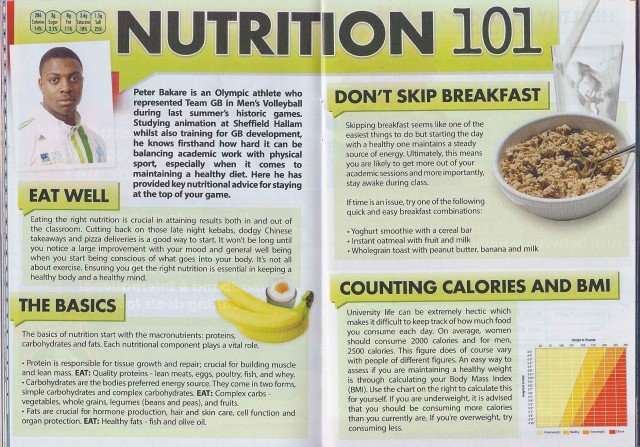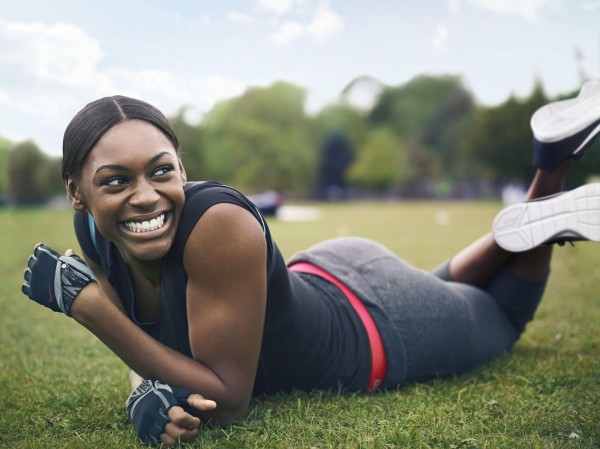Peter Bakare is an Olympic athlete who represented Team GB in Men’s Volleyball during last summer’s historic games. Currently on a sports scholarship at Sheffield Hallam, whilst also studying Animation, he knows firsthand how hard it can be balancing academic work with physical sport, especially when it comes to maintaining a healthy diet. Here he has provided key nutritional advice for staying at the top of your game.
Eating the right nutrition is crucial in attaining results both in and out of the classroom. Cutting back on those late night kebabs, dodgy Chinese takeaways and pizza deliveries is a good way to start. It won’t be long until you notice a large improvement with your mood and general well being when you start being conscious of what goes into your body. It’s not all about exercise. Ensuring you get the right nutrition is essential in keeping a healthy body and a healthy mind.
Basics of Nutrition
The basics of nutrition start with the macronutrients: proteins, carbohydrates and fats. Each nutritional component plays a vital role.
- Protein is responsible for tissue growth and repair; crucial for building muscle and lean mass. EAT: Quality proteins – lean meats, eggs, poultry, fish, and whey.
- Carbohydrates are the bodies preferred energy source. They come in two forms, simple carbohydrates and complex carbohydrates.
EAT: Complex carbs – vegetables, whole grains, legumes (beans and peas), and fruits. - Fats are crucial for hormone production, hair and skin care, cell function and organ protection.
EAT: Healthy fats – fish and olive oil
Don’t Skip Breakfast
Skipping breakfast seems like one of the easiest things to do but starting the day with a healthy one maintains a steady source of energy. Ultimately, this means you are likely to get more out of your academic sessions and more importantly, stay awake during class.
If time is an issue, try one of the following quick and easy breakfast combinations:
• Wholegrain toast with peanut butter, banana and milk
• Yogurt smoothie with a cereal bar
• Instant oatmeal with fruit and milk
Counting Calories and BMI
University life can be extremely hectic which makes it difficult to keep track of how much food you consume each day. On average, woman should consume 2000 calories and for men, 2500 calories. This figure does of course vary with people of different figures. An easy way to assess if you are maintaining a healthy weight is through calculating your Body Mass Index (BMI). Use the chart below to calculate this for yourself. If you are underweight, it is advised that you should be consuming more calories than you currently are. If you’re overweight, try consuming less.
Healthy Eating
Planning your meals and nutritional intake is essential in maintaining a healthy diet and achieving your physical goals. With that in mind, make sure you buy foods that will help you achieve what you want to achieve and also give you the long-term nutritional health benefits. Whether you’re trying to put on weight, lose weight, or simply trying to keep healthy, eating balanced meals is crucial. Think of your body like a car. If you put in the wrong fuel it will not function. And you’ll have to pay a hefty price to fix it. Your body needs the right nutrition to have maximise the benefits.
5 Day Evening Meal Plan
| Starches/Carbs | Meat/ Protein | Fruit/ Veg | Sauce |
| Pasta | Lean Mince | Mushrooms | Tomato |
| Tortilla | Chopped Chicken | Salad | Salsa |
| Rice | Kidney Beans | Onions, Peppers | Spicy Chilli |
| Bagels | Sliced Salmon | Avacado | Cream Cheese |
| Potatoes | Sausages | Peas | Gravy |
“Cooking a big pot of Tuna Pasta Bake was my favourite – It lasted 3 days so I saved a lot of time for the days I had to rush between training and lectures”
Perri Shakes Drayton
Team GB 400m Hurdles
World Indoor Champion 4×400 Relay
Brunel University Graduate
Working Out
If you want to build muscle, a quick and simple calculation is to multiply your weight (in pounds) by 17.5. This will give you a rough estimate of how many calories your body needs per day (not per meal!). Dividing your calorie intake into the following percentages will also help you achieve your goal: 40% proteins, 40% carbs and 20% fats.
Many people ask how much protein your body should have to pack on muscle. Try consuming 2g of protein for every kilogram of body weight each day. For example, if you weigh 80kg you should be eating approximately 160g of protein from a combination of foods and supplements for heavy muscle growth. It may seem like this is a lot of calories to take in but you can’t add mass without the extra calorie intake.
*Top Tip – Many athletes eat smaller meals but more regularly in order to get the right nutrients which will repair the body throughout the day. Eating regularly helps manage hunger cravings and can help prevent unhealthy snacking. Grazing on nuts, berries or dried fruit can be a perfect snack between meals.
Hydration
Staying hydrated is incredibly important. Not just for when you’re exercising or playing sports but also when you are studying. Concentration levels sap when you are dehydrated, which can seriously hamper how much you take in during lectures and seminars. Having a cup of tea before a 9am lecture will help massively.
During sports or training, being dehydrated can easily make you lose 2% of your body weight and also decrease your performance by up to 25%. It’s a no brainer that staying hydrated is important. Aim to consume about 16-24 ounces of fluid per hour during practice or training lasting 60 minutes or more. If you’re playing sport or training for more than 90 minutes, make sure you consume extra carbohydrates in the form of sports drinks, sports bars, gels or high-carbohydrate foods (i.e. fig bars or sliced fruit).
For more information on being a student athlete, visit:
www.yourstudentbody.com






